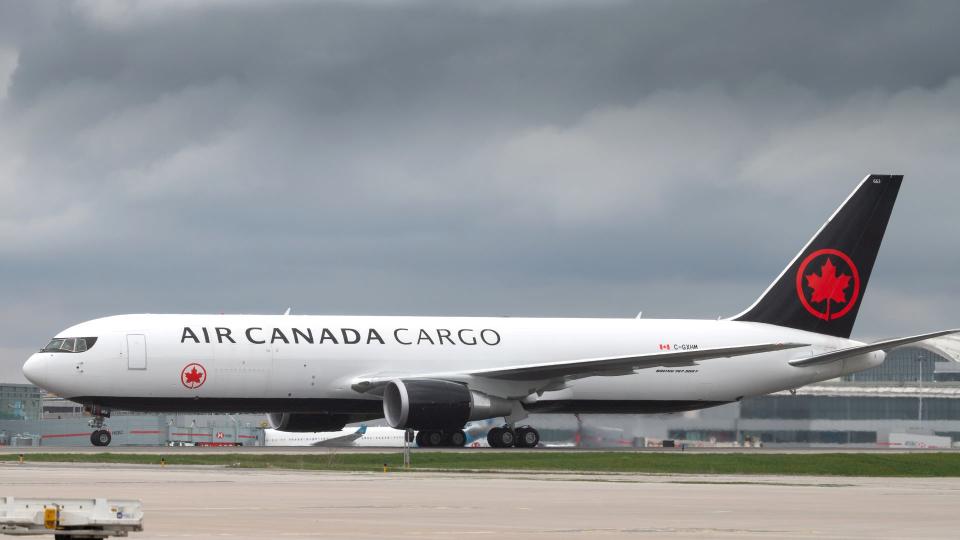Air Canada abandons plans for two converted Boeing 767 freighters

Air Canada has further scaled back its growth plans for its new cargo division, announcing Thursday that it has canceled orders with a supplier to convert two Boeing 767-300s into cargo planes.
The airline took a one-time charge of $14.5 million for canceling its production slot reservations at Israel Aircraft Industries, it said in its first-quarter earnings report.
Air Canada’s cargo airline division has been around for almost two and a half years and now has eight Boeing 767-300 freighters — six converted jets and two factory models. It had seven planes at the end of 2023. The raw material for the cargo conversions came from 767s retired from Air Canada’s passenger fleet.
Air Canada (TO: AC) canceled an order with Boeing for two production 777-200 freighters in late September due to a reversal in air cargo demand following the pandemic-fueled air travel boom that lasted until early 2022.
Management said the 18 Boeing 787-10 wide-bodies scheduled for delivery from late 2025 will have greater cargo capacity than many existing planes and will allow the airline to meet new demand.
All-cargo operators have adjusted their investment strategies over the past year in response to the freight recession that plagued the industry until last fall. Canadian airline Cargojet, for example, abandoned plans to acquire eight used Boeing 777s and convert them into cargo planes. Miami-based charter operator Global Crossing Airlines recently suspended plans to add narrow-body Airbus A321 cargo planes to focus on the passenger business. And Amerijet, another Miami-based cargo airline, returned six newly leased Boeing 757-200 freighters this year.
Positive Income Signs
Air Canada outperformed most of its peers in the cargo segment during the first quarter, as improving overall market conditions helped slow the pace of decline in cargo revenue.
The company said Thursday that freight revenue fell 9% year over year to $156.2 million, despite higher volumes driven by lower yields. The main culprit was the Atlantic market, which saw a decline in unit prices and volumes. The decline in European trade was partly offset by increased volumes in other markets, particularly in the Pacific, as increased passenger flights increased cargo capacity year-on-year. other.
Air Canada Cargo’s negative revenue growth is actually moving in a positive direction. Freight revenue fell 15% year-over-year in the fourth quarter. Full-year 2023 freight revenue declined 27% to $682 million. This reflects the recovery of the air cargo market since last fall, with growth of 11% for the first four months of the year compared to the same period last year.
Air Canada has also done a better job than many competitors at stemming freight revenue reductions. In North America, American Airlines and Delta Air Lines saw their cargo revenues decline by 15% and 16%, respectively, during the quarter. In Europe, Air France-KLM and Lufthansa said cargo revenue fell 16.5% and 17%, respectively. Avianca, a major South American carrier, said its cargo revenue was 8% lower year-on-year. United Airlines is the only passenger airline to surpass Air Canada, with cargo revenue of $391 million, down just 1.8% from last year.
Air Canada differs from its American counterparts in that it has a fleet of cargo planes that complements the cargo capacity of its passenger planes. Other airlines carry cargo only in the bellies of passenger planes, not counting occasional charter agreements with outside cargo companies.
The cargo division recently added Chicago O’Hare International Airport to its cargo network, with service scheduled to begin June 2. The service will operate three times a week, connecting the airline’s global hub in Toronto to its warehouse in Chicago.
Overall, Air Canada posted a loss of $60 million in the first quarter thanks to a 7% gain in revenue. Adjusted earnings before interest, taxes, depreciation and amortization were $329 million, an improvement of $30 million but below expectations as higher labor and maintenance expenses weighed on earnings. margins and passenger demand declined.
Click here for more FreightWaves stories by Eric Kulisch.
Sign up for American Shipper Air’s weekly newsletter here.
RECOMMENDED READING:
Labor actions drag Lufthansa Cargo to first-quarter loss
The collapse of the freight IT sector weighs on Air France-KLM’s results
Inflation dampens Cargojet’s outlook despite Q1 volume growth
The article Air Canada abandons plans for two converted Boeing 767 freighters appeared first on FreightWaves.
yahoo



